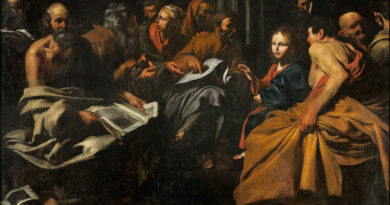Second Sunday of Easter/B
Massimo Palombella

In today’s Gospel (John 20: 19-31), the story of the Apostle Thomas and his need to verify “empirically” is recounted: “Unless I see in his hands the sign of the nails and put my finger in the sign of the nails and put my hand in his side, I do not believe”.
The Apostle Thomas can be praised as a ‘concrete’, practical, even, to some extent, ‘trustworthy’ man. In fact, a certain culture implicitly educates us to a healthy concreteness that ensures the right and measured stability and maintenance of situations where ‘certain and safe’ things are not questioned.
Jesus, in his relationship with Thomas, challenges us to go “beyond”: “Blessed are those who have not seen and have believed!”.
Jesus’ challenge is with regard to the true quality of our life, in the sense that, without the ability to dream, to risk, to “trust”, to “try”, there is no true life but only a sort of “cage” where we illude ourselves to live. In fact, the greatest and most beautiful things in our lives necessarily involve instances that are anything but ‘certain and safe’: falling in love, getting married, having children, expanding one’s knowledge, experimenting, dreaming of projects beyond the schemes received from an upbringing and even beyond the expectations of the people we consider important.
Fundamentally, Jesus calls into question our very notion of ‘peace’ understood, often and implicitly, as ‘stability’, ‘preservation’, where our best energies are spent on keeping everything ‘firm and stable’ and, without realising it, we stop trying to ‘venture out’.
Jesus awaits us “beyond” our “certain and secure” spaces, “beyond” where we are certain to meet him, “beyond” our detailed planning.
Jesus challenges us to be living, free people, people who, not without effort, make the Resurrection their genetic code.
The Offertory antiphon of today’s celebration is taken from chapter 28 of Matthew’s Gospel (Mt 28, 2.5.6) with the following text:
“Angelus Domini descendit de caelo et dixit mulieribus:
Quem quaeritis, surrexit, sicut dixit, alleluia.”
The Angel of the Lord came down from heaven and said to the women:
The One whom you seek has risen, as he said he would”, alleluia.
The attached music, in Gregorian Chant, is taken from the Graduale Triplex published in Solesmes in 1979. The interpretation is by the Monks of Solesmes.
A blessed Sunday and heartfelt greetings.

